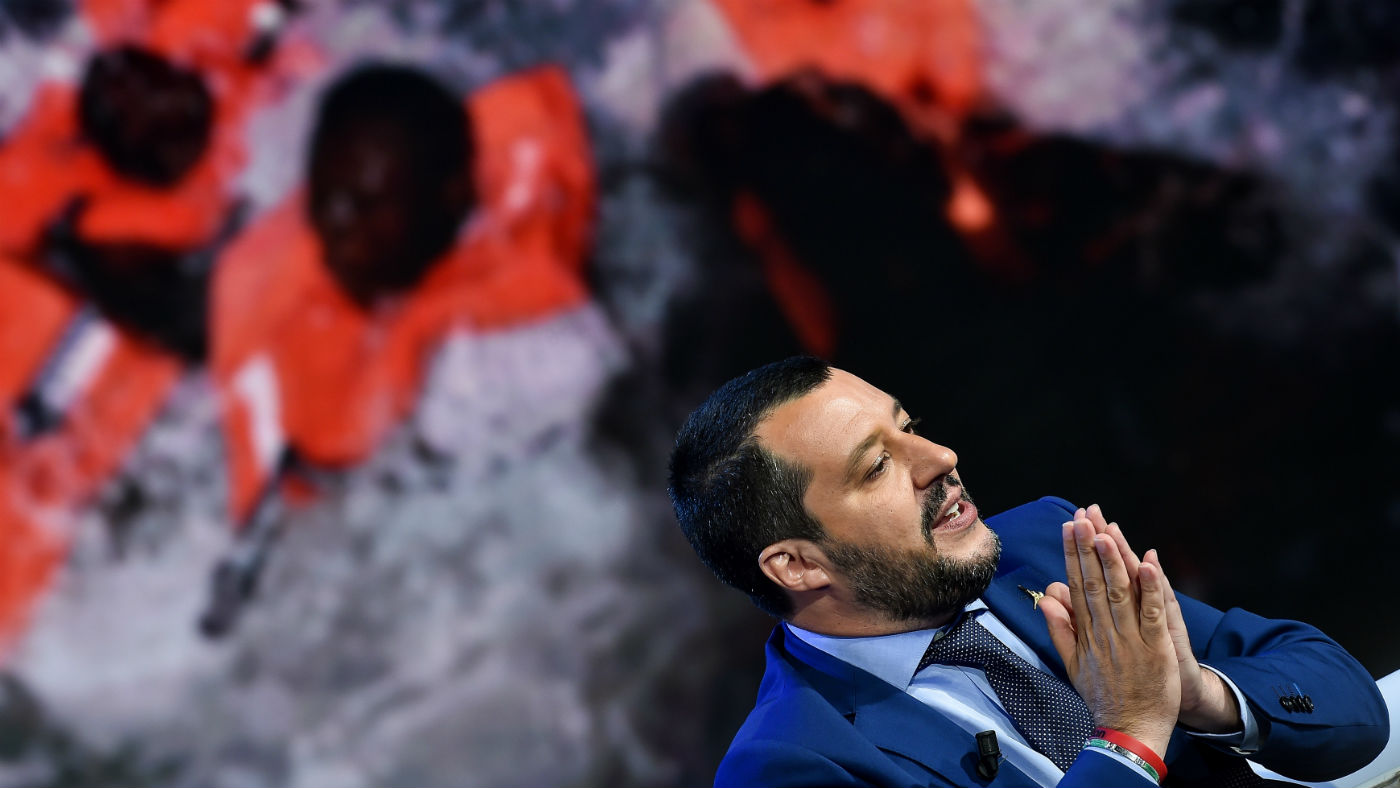Matteo Salvini: Italy’s interior minister faces kidnap charge
Far-right leader under investigation after 100 migrants confined on a rescue ship

A free daily email with the biggest news stories of the day – and the best features from TheWeek.com
You are now subscribed
Your newsletter sign-up was successful
Italy’s interior minister has been effectively charged with kidnap, illegal arrest and abuse of office after more than 100 migrants were confined to a coastguard rescue ship for ten days.
Matteo Salvini, the leader of far-right League party who is also deputy prime minister, has been placed under investigation by the public prosecutor in Agrigento, the equivalent in Italy of being charged.
Luigi Patronaggio said he had passed on evidence against Salvini and his chief of staff at the interior ministry to a ministerial tribunal for review for possible prosecution.
The Week
Escape your echo chamber. Get the facts behind the news, plus analysis from multiple perspectives.

Sign up for The Week's Free Newsletters
From our morning news briefing to a weekly Good News Newsletter, get the best of The Week delivered directly to your inbox.
From our morning news briefing to a weekly Good News Newsletter, get the best of The Week delivered directly to your inbox.
Italian coast guard ship Ubaldo Diciotti picked up 190 migrants on 15 August from an overcrowded boat off the coast of Lampedusa after they were refused entry to Malta. Salvini then refused to allow the majority of the migrants to leave the boat until Italy was given assurances that the migrants would claim asylum in other member states.
Among the questions pursued by the prosecutor are why the government failed to indicate a port of safety for the migrants, as required by international law, why the migrants had not been allowed to proceed with asylum requests, and why there was no written documentation on the handling of the contentious case.
A trial of Salvini in a special ministerial court would have to be approved by the Senate, “an outcome that remains unlikely as long as the government has a solid parliamentary majority”, says The Times.
However, while the outspoken politician has adopted a typically bellicose response to the charges, challenging magistrates to arrest him, “the investigation appears to have rattled him”, says the paper.
A free daily email with the biggest news stories of the day – and the best features from TheWeek.com
On Sunday, the government performed a rare U-turn, granting permission or the remaining 137 people on board the coastguard ship Diciotti to disembark in Catania.
The decision to let people off the vessel “concluded a bitter stand-off between Rome’s anti-establishment government and its European Union partners”, reports The Independent, after Italy initially insisted other European nations agree to take the majority of the migrants, who are mainly from Eritrea.
More than 650,000 people have reached Italian shores since 2014, and even though the numbers have fallen steeply in the last year, Rome says it will not let any more rescue ships dock unless the migrants are shared out around the EU, and has even threatened to suspend the country’s financial contribution to the EU if its demands were not met.
Yet despite private concerns over the charges, Salvini’s hardline response to the refugee crisis is proving increasingly popular with voters.
Polls suggest the League’s anti-immigrant stance has seen support for the party, and for Salvini in particular, jump from 17% nationally in April’s election to over 30% today.
-
 Political cartoons for February 14
Political cartoons for February 14Cartoons Saturday's political cartoons include a Valentine's grift, Hillary on the hook, and more
-
 Tourangelle-style pork with prunes recipe
Tourangelle-style pork with prunes recipeThe Week Recommends This traditional, rustic dish is a French classic
-
 The Epstein files: glimpses of a deeply disturbing world
The Epstein files: glimpses of a deeply disturbing worldIn the Spotlight Trove of released documents paint a picture of depravity and privilege in which men hold the cards, and women are powerless or peripheral
-
 Epstein files topple law CEO, roil UK government
Epstein files topple law CEO, roil UK governmentSpeed Read Peter Mandelson, Britain’s former ambassador to the US, is caught up in the scandal
-
 Iran and US prepare to meet after skirmishes
Iran and US prepare to meet after skirmishesSpeed Read The incident comes amid heightened tensions in the Middle East
-
 Israel retrieves final hostage’s body from Gaza
Israel retrieves final hostage’s body from GazaSpeed Read The 24-year-old police officer was killed during the initial Hamas attack
-
 China’s Xi targets top general in growing purge
China’s Xi targets top general in growing purgeSpeed Read Zhang Youxia is being investigated over ‘grave violations’ of the law
-
 Panama and Canada are negotiating over a crucial copper mine
Panama and Canada are negotiating over a crucial copper mineIn the Spotlight Panama is set to make a final decision on the mine this summer
-
 Why Greenland’s natural resources are nearly impossible to mine
Why Greenland’s natural resources are nearly impossible to mineThe Explainer The country’s natural landscape makes the task extremely difficult
-
 Iran cuts internet as protests escalate
Iran cuts internet as protests escalateSpeed Reada Government buildings across the country have been set on fire
-
 US nabs ‘shadow’ tanker claimed by Russia
US nabs ‘shadow’ tanker claimed by RussiaSpeed Read The ship was one of two vessels seized by the US military